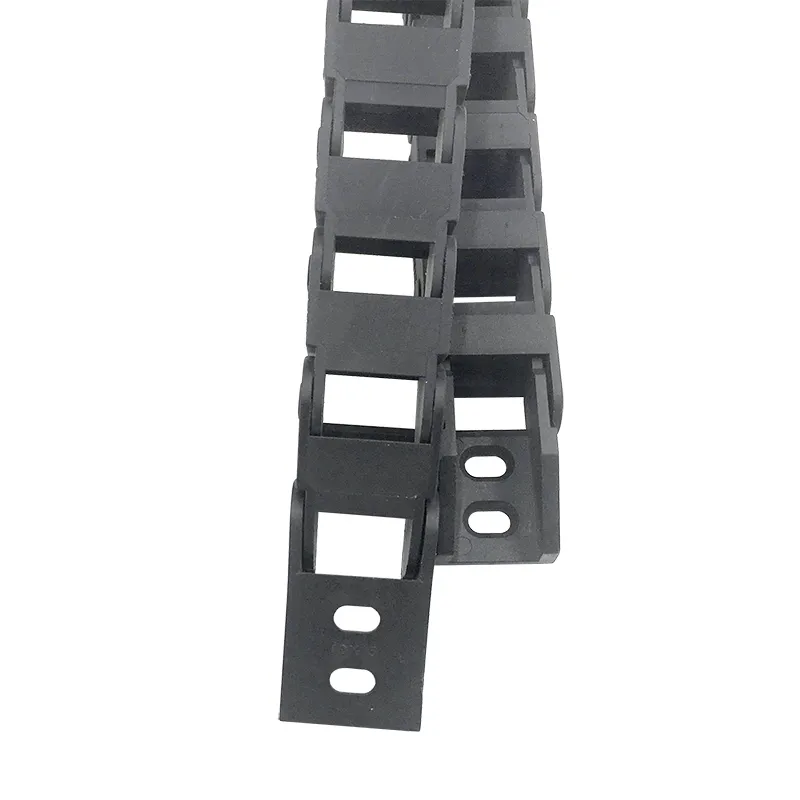metal cable carrier chain
Understanding Metal Cable Carrier Chains A Comprehensive Overview
In the dynamic world of industrial automation, the efficiency and reliability of machinery play a paramount role in ensuring seamless operations. One essential component that significantly contributes to this efficiency is the metal cable carrier chain. This article aims to shed light on the topic of metal cable carrier chains, outlining their purpose, benefits, and applications.
What is a Metal Cable Carrier Chain?
A metal cable carrier chain, often referred to as a cable drag chain or cable carrier, is a mechanical system designed to guide and protect cables, hoses, and tubes in a variety of industrial applications. These chains are constructed from durable metal materials, which makes them particularly suited for harsh environments, including those that involve high temperatures, chemicals, and mechanical wear and tear.
The primary role of a metal cable carrier chain is to organize and manage suspended cables and hoses, preventing them from tangling or getting damaged during operation. By allowing for controlled movement, metal cable carrier chains ensure that the integrity and functionality of the cables are maintained, which in turn enhances overall equipment longevity.
Key Features and Benefits
1. Durability Metal cable carrier chains are engineered to withstand extreme conditions. Unlike their plastic counterparts, metal chains can endure significant wear from heavy loads and harsh environments, making them ideal for heavy-duty applications.
2. Protection These carriers provide robust protection for cables from external elements like dust, moisture, and chemicals. This protection is crucial in industries such as manufacturing, where exposure to harmful substances can lead to cable failure.
3. Space Efficiency Designing machinery with metal cable carrier chains promotes better organization and neat arrangements of cables and hoses. This not only optimizes space but also enhances safety by reducing tripping hazards associated with loose wires.
4. Customization Metal cable carrier chains can be tailored to specific applications, allowing for unique solutions tailored to individual machinery needs. They come in various sizes and configurations to accommodate different types of cables and capacities.
metal cable carrier chain

5. Reduced Maintenance With their robust design, metal cable carrier chains require less frequent maintenance compared to other systems. This reliability reduces downtime, ultimately leading to improved productivity.
Applications of Metal Cable Carrier Chains
Metal cable carrier chains are versatile components used in numerous industries, including
- Manufacturing In assembly lines and production facilities, these chains facilitate the movement of electrical and data cables, ensuring a smooth operational flow.
- Robotics As robotics technology advances, the need for efficient cable management grows. Metal cable carrier chains help in guiding and protecting the cables in robotic arms and automated machinery.
- Construction Equipment In heavy machinery where cables are subjected to continuous movement, such as cranes and excavators, these carriers provide the necessary support and protection.
- Automotive Metal cable carrier chains are used in automotive manufacturing plants to manage the intricate network of sensors and wiring that control modern vehicles.
Conclusion
Metal cable carrier chains are an indispensable element within the machinery of various industries, ensuring efficient cable management and protection in demanding environments. Their durability, protective capabilities, and versatility underscore their significance in modern industrial applications. As technology continues to evolve, the design and functionality of these cable carrier systems will likely advance, providing even more efficient solutions for cable management challenges.
In summary, understanding the importance of metal cable carrier chains is crucial for anyone involved in industrial operations. By investing in quality metal cable carriers, organizations can enhance machinery productivity, reduce maintenance costs, and improve overall operational efficiency. Embracing this technology is essential for staying competitive in today’s fast-paced industrial landscape.








